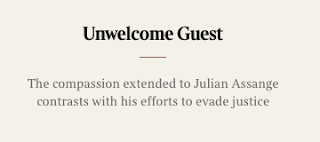Allison Pearson in the Telegraph: "I’m not scared, Clive. To be honest with you, I’m angry. Angry that, night after night, you and your colleagues drive the juggernaut of panic straight into viewers’ homes. Angry that there are so many positive statistics and stories, which would bring much-needed optimism to millions of battle-weary Britons, but the national broadcaster prefers to hang out like a ghoul in a graveyard, implying that everyone buried there died of Covid."
Gulnoza Said, Committee to Protect Journalists' Europe and Central Asia program coordinator, on Russian authorities threatening and harassing journalists covering protests called for by jailed opposition leader Alexei Navalny: “Despite being poisoned and repeatedly thrown into jail, Alexei Navalny refuses to go away, so Russian authorities will likely try to make him and his supporters disappear via censorship. Journalists must be allowed to report freely and safely on crucial political developments in the country – even the ones that authorities are afraid of.”
Rupert Murdoch, accepting the Australia Day Foundation’s lifetime achievement award, quoted by The Hill: “For those of us in the media, there’s a real challenge to confront: a wave of censorship that seeks to silence conversation, to stifle debate, to ultimately stop individuals and societies from realising their potential. This rigidly enforced conformity, aided and abetted by so-called social media, is a straitjacket on sensibility. Too many people have fought too hard in too many places for freedom of speech to be suppressed by this awful woke orthodoxy.”
Recruitment ad for new tv and digital channel GB News: "We’re looking for brilliant journalists from all backgrounds to help us shake things up. You’ll be bursting with ideas and determined to find original stories and new voices from every part of the country. You’ll be a disruptor and an innovator who approaches the news in a provocative and entertaining way. We are serious about changing things, so only apply if you genuinelywant to make a difference and reflect the stories and issues that really matter to the people of the UK."
The Guardian reports: "Rolling Stone magazine is offering 'thought leaders' the chance to write for its website if they are willing to pay $2,000 to 'shape the future of culture'. The storied magazine, which has published journalism by writers including Hunter S Thompson, Patti Smith and Tom Wolfe, approached would-be members of its new 'Culture Council' by email, telling them that they had the chance to join 'an invitation-only community for innovators, influencers and tastemakers'. Emails seen by the Guardian suggest that those who pass a vetting process – and pay a $1,500 annual fee plus $500 up front – will “have the opportunity to publish original content to the Rolling Stone website”.
NUJ general secretary Michelle Stanistreet in a statement after the BBC revealed it had spent more than £1 million on barristers and solicitors to deal with tribunal claims brought by staff in equal pay and race discrimination cases: “It’s a shocking sum of money to have spent on defending the indefensible. There have been so many occasions in the past four years when the NUJ has urged the BBC to stop wasting money on lawyers and instead sort things out sensibly with individuals who have been discriminated against and cheated out of pay and pension contributions. There have even been equal pay cases amongst them where we have been confident that the arrears in salary owed were ultimately dwarfed by the cost of the legal team arguing against settling."
Insight editor Jonathan Calvert asked "What do you hate most about the job?" in The Sunday Times [£]: "Dealing with needlessly aggressive media lawyers who seem to be paid by the yard, judging by the length of their letters."
Actor Philip Glenister in The Sunday Times Magazine on playing DCI Gene Hunt in Life on Mars [£]: "The show really raised my profile, but I only ever had one unsavoury paparazzi incident. I noticed this blacked-out van following me around where I live in East Sheen. I went up to the driver and said: 'If you want a picture, just take one and f*** off because I’m out with the kids.' He said: 'Look mate, I’m just doing my job. And how do you know I was following you, anyway?' I said: 'Well, believe it or not, I play a f***ing detective!'.”
[£]=paywall













































